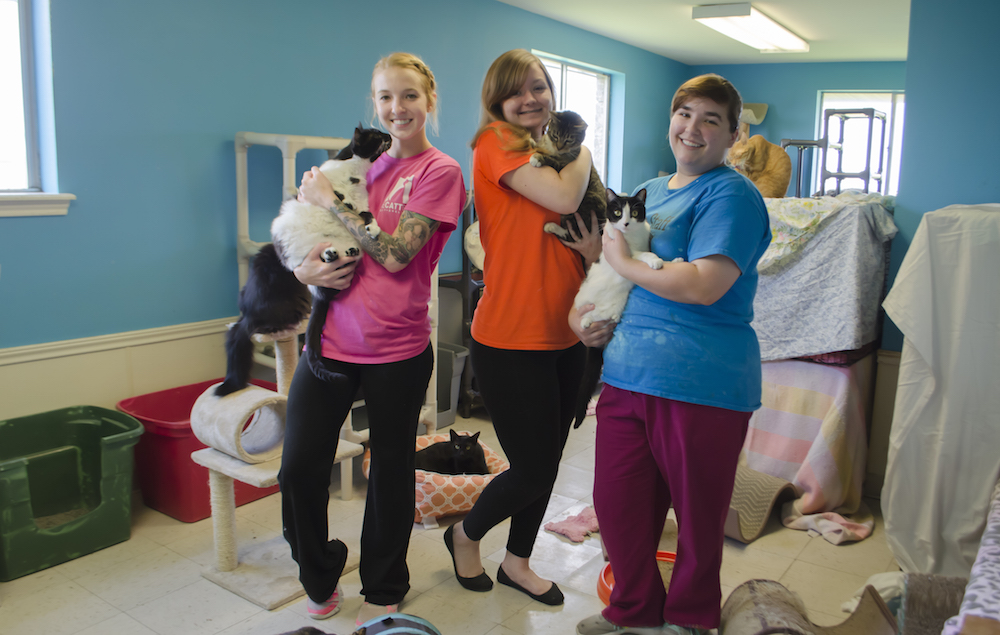Tucked away amidst the farmland and quiet green pastures near the southern part of Weber Road and Crosstown Expressway intersection lies a safe haven for cats and a dream come true for cat lovers. Since The Cattery was founded in 2007 by Executive Director Samantha Persons and her husband, Scott, who serves as president of the board, the organization has given sanctuary to thousands of homeless, abused or abandoned cats.
“This is a cage-free, 100 percent, no-kill environment,” said Kathryn Krebs, adoption counselor at The Cattery. “We try to help our kitties find permanent, loving adoptive homes while, at the same time, helping the public become aware of the value of animals and their welfare. We also combat overpopulation by offering free or low-cost spay and neuter services.”
Since The Cattery opened as the city’s first high-quality, high-volume, low-cost spay/neuter clinic, more than 21,000 surgeries have been completed at little to no cost with the help of grants and individual funding. In 2015, the organization launched the area’s first mobile spay/neuter clinic, a 33-foot vet-on-wheels that visits city neighborhoods and nearby towns without other access to animal health care.
In 2016, The Cattery opened a thrift shop called Retail Therapy! to help raise money. Its headquarters at 8201 Weber was given to the organization by a generous donor. A cage-free environment, the facility designates rooms for the furry feline residents to roam freely and socialize. Rooms are filled with cat beds, scratching posts, blankets and pillows, enabling cat residents to relax in luxury and comfort.
One room is for kittens ages 4 months or younger while another houses teenagers ages 4 months to less than 1 year old. The adult room is for cats older than a year.
“We have a section for special-needs cats and a quarantine area for cats that are sick or need privacy,” Krebs said. “We also have cat boarding services available for rent. And for the cats who aren’t exactly ‘people persons,’ we have an outdoor feral sanctuary with water and food provided daily.”
Many of The Cattery’s residents are rescues found and brought in by caring individuals or by cat owners no longer willing or able to care for them.
“Often, people will find abandoned or stray mama cats with their kittens,” Krebs continued. “Babies under two pounds need 24-hour attention, and because we are not a 24-hour facility, our volunteers can sign up as foster parents for those kittens and take them home. We’ll provide the supplies, and once the kittens reach two pounds, they can bring them back to us.”
Owners no longer able to take care of their cats can bring them in and sign an owner release form, after which, the cat will be vaccinated and fixed (if needed) and made ready for adoption.
The Cattery’s adoption program matches loving, approved families with compatible cats and averages 12 adoptions per week, totaling more than 600 per year. In addition to finding homes for homeless kitties, The Cattery serves as a resource for pet owners in the community, helping families solve behavior issues or other problems that could lead them to surrender their pets.
Those wanting to adopt cats take a tour of the facility to get to know the cats. Once they select a cat, they are given an adoption application asking about living environment and pet history. After paying the standard adoption fee of $60, the animal goes home with a free bag of Science Diet and a Healthy Start Certificate from Oso Creek Animal Hospital, a partner of The Cattery.
HOW TO VOLUNTEER
The Cattery constantly needs volunteers and donations of money and material items, said Sarah Beers, assistant manager of shelter operations.
“We accept almost anything you can think of for both the shelter as well as our thrift store,” Beers said.
Needed donations include: clay or scoopable litter, gas cards, postage stamps, paper towels, bleach, hand sanitizer, canned cat food (preferred brands are Friskies or Fancy Feast), laundry detergent, dishwasher detergent, dish detergent, copy paper, dry Swiffer pads, animal pee pads, pet toys, blankets, pillows, towels and cat beds.
Volunteers attend a one-time orientation, held every second Saturday of the month, and are asked to commit to a minimum of six hours of service per month during normal business hours. Youth volunteers are welcome and must attend orientation with a parent or guardian. Ages 12-17 can volunteer on their own. Those under 12 must be accompanied by a guardian.
New volunteer tasks include cleaning and administrative tasks such as filing and answering phones. Experienced volunteers are given opportunities for additional training, animal interaction and care. Hours available for volunteering at the shelter are: Monday and Tuesday, 9 a.m.-noon; Wednesday and Thursday, 9 a.m.-noon and 3-5 p.m.; and Friday-Sunday, 9 a.m.-5 p.m. Adult volunteers can work any amount of time during these hours. Youth volunteers are limited to three hours per day.
Despite the amount of work involved, Beers finds her job rewarding,
“I feel so happy whenever I see a cat that has been at our shelter for a long time finally go to a new home,” she said. “I’m also proud of our team of adoption counselors who know these cats very well and can match each cat with a family that is compatible with them. It makes all the hard work we and the volunteers do worthwhile.”
The Cattery cat shelter is located at 8201 Weber in Corpus Christi.
For more information, call (361) 854-MEOW (6369) or visit thecatterycc.org.
